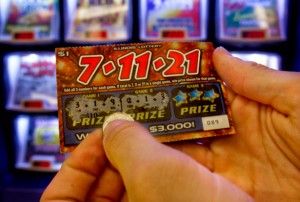Illinois online lottery sales could raise gambling rates

April 5, 2012
Illinois became the first state in the nation to provide the selling of lottery tickets online, which experts said could lead to addiction
among buyers.
Illinois Lottery officials said the first day of online sales, March 25, brought in more than $15,000.
Advertisement
The sales show signs of becoming a growing trend, which could affect gamblers and stores that sell lottery tickets with the easy accessibility of purchasing tickets.
Illinois is the first state to provide online gambling since the U.S. Justice Department reversed its stance on preventing states from conducting online gambling in January. This reversal allows virtually any gambling to be provided by states, except
on sporting events.
Only tickets for the Mega Millions and Lotto are available online at the moment, and playing the Illinois Lottery online is only available to Illinois residents.
When registering to play, a social security number must be provided, along with other proof of identification, in order to prevent underage participants from playing.
With gamblers going to the web for lottery tickets, some experts are worried about addiction, including Mark Dixon, professor of behavioral psychology and director of the SIUC Gambling Intervention Program.
Dixon has had his research published across the world and has been featured in local and national media outlets.
Advertisement*
He said people gamble for many different reasons such as the rush of the game, the social experiences it creates, the escape it provides from something painful in life or for the thought of getting money without a lot of work. He said surprisingly, a very small portion of people gamble for quick cash
without work.
Dixon said he believes the amount of lottery tickets will increase with the availability of online purchasing. He said he believes the state should track purchases and inform frequent customers they might have a gambling problem.
One individual interested in the online lottery is André Gloude, a senior from Austin, Texas studying automotive technology, who said he buys lottery tickets once a year and will probably buy more now that they are available online.
He said he believes the future of gambling will move online because it is more convenient. Gloude said he thinks people should keep track of their gambling and gamble in moderation.
Another interested student is Jared Bryan, a freshmen from Peoria studying computer science. Bryan said he rarely buys lottery tickets, however, he might buy more often now sales can be done online.
He said he believes the future of gambling will be online and is not a problem if people can control how much they gamble.
The best way to deal with gambling addiction, Dixon said, is to have a clear understanding of the true odds of winning, which are usually terrible, and get effective therapy.
He said the Gambling Intervention Program offers free therapy and sometimes has the opportunity to pay students to try to quit gambling. He said the most important outcome, which makes him proud of his work, is when clients come in and tell their therapists they have changed their lives.
While online sales could affect the well-being of frequent ticket buyers, the amount of physical lottery sales does not seem to be taking a hit to local businesses.
Thomas Millville, a senior at John A. Logan College studying mechanical engineering, said he believes physical ticket sales will not drop. Millville, an employee of Pinch Penny Liquors, said ticket sales in the store have been booming since the recent Mega Million, even during the night shift, which usually sees a dip in sales compared to the day.
He said most of the customers coming in to buy tickets are older people and tend to be recurring buyers. Millville said he believes sales will not be affected by the availability of tickets online because most customers are older and probably less tech-savvy than younger individuals.
Advertisement







